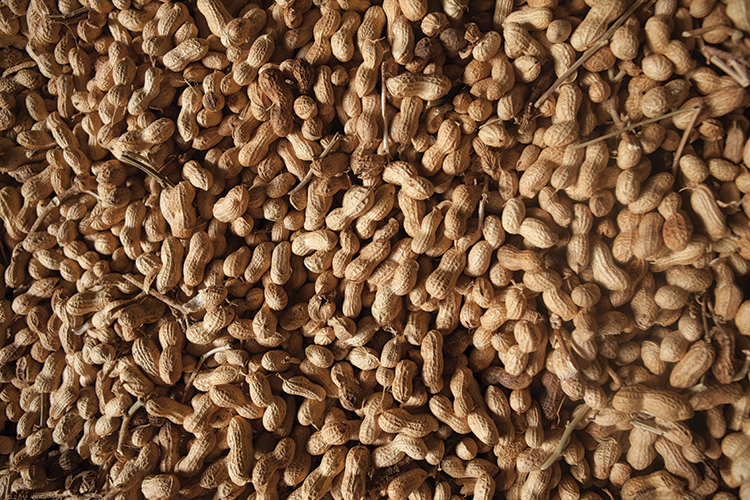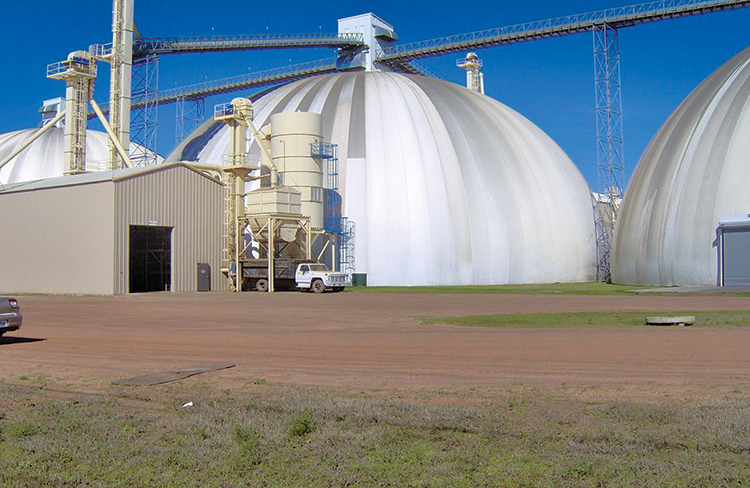Home > Georgia > Georgia Crops & Livestock > Georgia’s Plentiful Peanuts
Georgia’s Plentiful Peanuts
 The nation is nuts for Georgia’s peanuts – every year, state farmers produce 57 percent of the national peanut supply. That’s more than 1.7 million tons in a year. Across the state, 3,500 farmers plant, grow and harvest peanuts – which are not actually nuts at all but legumes – planting up to 780,000 acres. In fact, the state ranks No. 1 in the nation for its number of peanut acres.
The nation is nuts for Georgia’s peanuts – every year, state farmers produce 57 percent of the national peanut supply. That’s more than 1.7 million tons in a year. Across the state, 3,500 farmers plant, grow and harvest peanuts – which are not actually nuts at all but legumes – planting up to 780,000 acres. In fact, the state ranks No. 1 in the nation for its number of peanut acres.
And some of those farmers are co-opting their operations. Georgia-based company Tifton Quality Peanuts LLC (TQP) has been making its mark in the peanut industry – both at home and overseas – since it was founded in 2004. The cooperative is grower-owned, with about 140 farmers spread over 24 counties in south Georgia. It owns a shelling plant, where approximately 600 tons of peanuts are shelled 24 hours per day, with an annual capacity of about 135,000 tons of farmer stock. This adds up to about 180 to 200 million pounds of edible peanuts, says Bill Park, TQP’s president and CEO.
With ever-increasing farming and input costs, the farmers realized the advantage of vertically integrating their operations into TQP.
“Farmers also felt that marketing their peanuts directly to manufacturers would improve their return,” Park adds. “Many of TQP’s producers are also cotton farmers, and are owners or members in similar co-op cotton gin facilities. Being part of a co-op allows the grower to focus on yields and production and less on storage and marketing.”
Plus, growers make additional profit by processing their peanuts at the facility rather than using an outside sheller.
![Georgia peanut [INFOGRAPHIC]](https://eadn-wc01-4177395.nxedge.io/wp-content/uploads/2020/05/Screen-Shot-2016-09-19-at-10.42.55-AM.jpg) Peanut Benefits
Peanut Benefits
Initially, TQP focused its efforts on exporting because of the ample peanut supply in the nation in previous years. Today, TQP markets peanuts primarily into the domestic market with some exports into Canada, Mexico, Europe, and more recently China, while providing “bar-ready” peanuts to some of their customers.
“TQP customers include many well-known companies like Hershey, Smucker’s, Planters and Algood Foods,” Park says. “The shelling plant also produces wildlife feed as well as oil stock used to produce peanut oil. The peanut hulls are also marketed.”
In 2015, TQP opened its peanut blanching facility, with the goal to further integrate the cooperative’s business plan, increase blanching capacity in the industry and bring members additional profits.
“TQP’s blancher is located in a pre-existing flat storage warehouse in close proximity to the shelling plant, which allows quick transfer of redskin peanuts to the blancher,” Park says. TQP only blanches peanuts from its shelling plant.
TQP has local impact on jobs, too. The shelling plant employs 65 full-time personnel, and usually an extra 12 to 15 part-time members during the harvest season. And the blancher has 25 full-time people who operate two 12-hour shifts about four or five days each week.
Park manages TQP along with CFO Jason Shivers, and both attribute TQP’s success to the members who provide quality peanuts to the shelling plant every year, as well as the employees who provide a high-quality finished product and dependable service.
About TQP overall, Park says – as the co-op’s motto states – “Quality is our middle name.”




